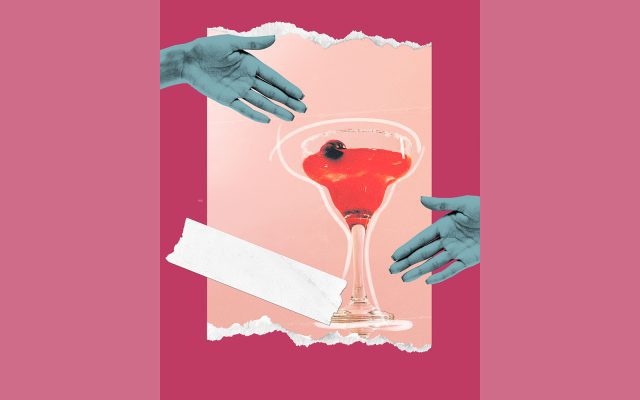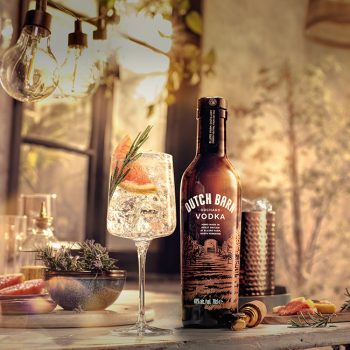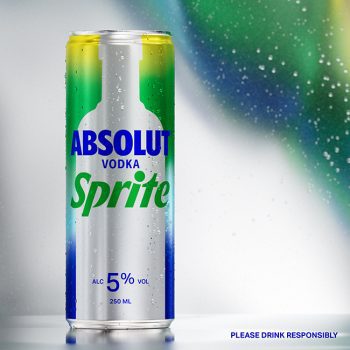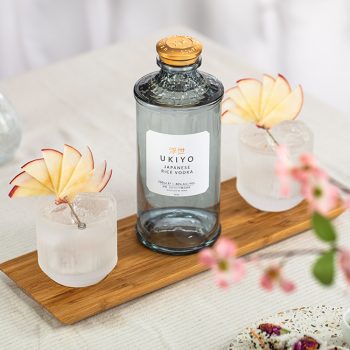This website uses cookies so that we can provide you with the best user experience possible. Cookie information is stored in your browser and performs functions such as recognising you when you return to our website and helping our team to understand which sections of the website you find most interesting and useful.
The reinvention of vodka
By Lauren EadsWhile it has never gone away, vodka is enjoying a resurgence, thanks to new flavours and stories. We speak to producers about a spirit that is enjoying a second wind.

*This feature was originally published in the April 2024 issue of The Spirits Business magazine.
It goes without saying that vodka is one of the world’s most successful spirits. Revered for its versatility and reliability, it remains the best-selling spirit in the US, accounting for 30% of all spirit volumes in 2023 and generating US$7.2 billion in sales, according to the Distilled Spirits Council of the US. Last year, research company Research and Markets predicted the global vodka market could be worth US$40.25 billion by 2030, up from US$25.95bn in 2023. But for all of its success, vodka has never invited the same level of engagement as other spirits, dismissed by some as too simple or even boring. It’s not surprising, given that vodka’s biggest virtue has been neutrality and an inability to ‘taste’ it, hindering motivation to explore the category.
As Stephanie Jacoby, global senior vice-president at Smirnoff, says: “Vodka is one of the world’s biggest spirits categories but has historically been a bit of an unsung hero – playing a key role in the drinks industry yet not being as prominent a part of the cultural conversation as many as other spirits.”
Time for a reappraisal
Meanwhile, some of the spaces in which vodka has thrived have served to pigeonhole the spirit, excluding a wider demographic.
“For a long time, vodka entered this space of overt status projection with rappers, bling, sparklers, and big bottles, particularly successful when those on-trade party venues were flying,” says Ross Haddow, chief marketing officer at Ellers Farm Distillery in North Yorkshire, which makes Dutch Barn Orchard Vodka, and has been co-owned by comedian Ricky Gervais since November 2023. “This world will always resonate with a certain consumer, but there are a growing number of them looking for something else, and, until now, vodka has failed to evolve with this. There is a reappraisal of how good vodka can be.”
Why is there renewed optimism about vodka’s ability to transform its image, and how are producers reinventing a classic?
The rise of the ready-to-drink (RTD) market is one of the most significant developments, with vast potential to recruit new generations to the category. RTD volumes have been growing faster than any other major drinks category since 2018, according to IWSR Drinks Market Analysis.

The global RTD market is expected to grow by 12% in volume between 2022 and 2027, and be worth US$40bn in 10 key markets: Australia, Brazil, Canada, China, Germany, Japan, Mexico, South Africa, the UK, and the US. In the US, the RTD category is expected to be worth US$21.1bn by 2027, growing at a compound annual growth rate of 16%, led by spirit-based hard seltzers and pre-mixed cocktails. Vodka is the most popular spirit base, with malt-based seltzers now in decline.
“Many of today’s younger legal-drinking-age consumers are opting for RTDs as their entry into beverage alcohol, with many of the RTDs being vodka-based,” says Adam Rogers, IWSR’s North America research director. “Since RTDs act as a bridge product to the full-strength version, vodka will eventually experience an increase in consumer attention once they cross that bridge.”
Underlining vodka’s prominence among Gen Z, last month socialite Kylie Jenner launched Sprinter, a line of 100-calorie vodka sodas in Black Cherry, Peach, Grapefruit, and Lime flavours. Meanwhile, White Claw, the malt beverage credited with igniting the hard seltzer boom, launched a line of vodkas and vodka sodas in 2023.
Equally significant is the premium positioning of today’s RTDs, which are a far cry from the sugar-laden, neon-coloured, value-driven alcopops of the past. Today, RTD brands are prioritising refined flavour innovations and premium brand partnerships. This year, in the UK, Pernod Ricard partnered with Coca-Cola to launch its 5%-ABV Absolut Vodka Sprite, which follows a previous partnership with Ocean Spray cranberry juice in the US.
“The RTD realm is ripe with opportunities for such innovative alliances, nurturing not only positive consumer perceptions but also invigorating our brand with a zestful spirit,” says Deb Dasgupta, vice-president of global marketing at Absolut. Its launch coincides with the release of Diageo’s Smirnoff Smash vodka soda line, which includes a Strawberry Dragon Fruit flavour, and sits alongside its vodka-based Smirnoff Ice Lavender Lemonade, also launched in 2024. These are the descendants of Smirnoff Ice that are not vodka-based, but a flavoured malt beverage. It was one of the “OG RTDs”, says Jacoby, who suggests that today it is vodka fuelling the RTD category, not the reverse.
The revival of classic cocktails such as the Martini and Cosmopolitan, as well as the popularity of the Espresso Martini, are also driving the RTD market in vodka’s favour. This year, actor Dan Aykroyd’s Crystal Head released a canned Espresso Martini and Cosmopolitan. Last year, Grey Goose released its first ‘bartender-quality’ bottled Martini, made with Grey Goose vodka, French vermouth, and a dash of orange bitters.
The RTD category is “poised to play a significant role” in the revival and reinvention of vodka, believes Aleco Azqueta, vice-president of marketing, Grey Goose North America. “Premiumisation is at the top of consumers’ minds as a growing number of people are looking to drink less but higher-quality spirits that provide a taste of luxury,” he says. “We’ll continue to see the prestige tier really take off in the near future. Ultra-premium white spirits are predicted to grow by 79% in the next five years, which is five times faster than the growth of the entire spirits category.”

Flavoured vodka remains a key component of the straight vodka market. But while the 2010s brought us sickly-sweet confectionery-based variants, the 2020s is bringing us the opposite, with natural, savoury, spiced, and botanical ingredients trending. Pernod Ricard’s Absolut Nights shot range aims to marry the “uniqueness of regional traditions and tastes with universal appeal”. Its latest expression, Absolut Nights Orange Peel, launched in China in March, and is made with a blend of orange peel and coffee. It’s inspired by chenpi, a dried orange rind often used in Chinese cooking, and joins the Smoky Piña, a nod to Mexican zest, and the Scandi-influenced Nordic Spice, which were both released last year.
Meanwhile, this year Diageo released its Smirnoff Spicy Tamarind vodka in the UK, following rollouts in Mexico in 2015 and in the US in 2020. “The spirits landscape is undergoing a renaissance, marked by the emergence of artisan brands that draw their essence from local heritage and the rising trend of celebrity involvement in brand ownership, exemplified by Ricky Gervais’ recent venture,” adds Dasgupta. Recently we’ve seen Daniel Craig bust a move for Belvedere, and Jason Momoa co-found Meili Vodka in 2023, not to mention Kylie Jenner’s range of vodka sodas. “What I think vodka is excelling at more than ever, and why it would appear to be penetrating the cultural zeitgeist, is product innovation and campaign-led marketing,” adds Jacoby.
What’s happening in the straight vodka space is just as transformative. Consumers are seeking out more premium vodkas, but those “with character and texture”, not just “100x distilled, no-flavour styles,” says Dawn Davies, spirits buyer at The Whisky Exchange. The UK spirits retailer reported 7% growth for vodka in 2023, and has predicted a vodka revival in 2024. “We are seeing a trend towards vodka brands that are sustainable and have great flavour and texture, the smaller producers, and those with a real story – I think this is being driven by a savvier consumer who wants more information on what they are drinking,” says Davies.
Online spirits retailer Master of Malt also singled out vodka in its 2024 trends report, calling it a “dark horse”, with Adam O’Connell, content marketing manager, noting a growing appreciation for vodka driven by spirits “with flavour and personality that use unique methods or ingredients”.

Examples include Pod Pea vodka, which launched in 2023, and is made in Manchester with British peas from Suffolk, and Ukiyo Japanese Rice Vodka, made from rice grown on the island of Okinawa. Ewe Whey Vodka is made by Ewenique Spirits in Wales from leftover whey – a by-product of cheese production. B Corp-certified Ellers Farm Distillery makes its Dutch Barn Orchard Vodka by distilling British apples using 100% renewable electricity, and is packaged in brown, recycled glass.
“Most people believe vodka is a tasteless, neutral spirit, but the apples that we hand-craft our liquid from produce a beautiful but subtly distinctive taste like no other,” says Haddow. “We’re aiming to help vodka discover a modern identity, and we’re doing it by leading with authenticity, as you’ll no doubt see and hear through Ricky Gervais.”
Respirited is another sustainably-produced British vodka, from Hayman’s Distillery, made by re-distilling surplus grain spirit. “Consumers are looking for high-quality sustainable products, while the perception for premium is changing and becoming more values based,” says co-owner Miranda Hayman. “The focus is moving away from exclusivity and towards transparency, uniqueness, provenance and status.”
We’ve seen small-batch, ‘craft’ vodkas before. But a wider shift that shuns neutrality in favour of flavour, authenticity and sustainability is raising the bar, while RTDs are fuelling a thirst for vodka-based beverages. It might sound overblown to describe vodka’s ongoing evolution as a revival – it never really went anywhere – but a reinvention is afoot. And it is one that is reframing vodka as a more dynamic, serious spirit, and, most importantly, one that’s worth talking about.
Vodka was the leading spirit by volume and value in the US last year. What are consumers looking for and how can the category keep ahead of the fast-growing Tequila category?
Gemma Parkinson – chief marketing officer, Belvedere
“We have seen the tide turning for vodka, which fills us with excitement and optimism here at Belvedere. Consumers’ thirst for knowledge, novelty, and uncompromising quality is on the rise, and we enthusiastically embrace this challenge. Our product innovations reflect our dedication to upholding the highest standards of quality, blending heritage and modernity in unique expressions of taste.
“One such innovation is Belvedere Organic Vodka, a testament to our unwavering pursuit of excellence. With global distribution at its core, this transition underscores our belief that only by sourcing the finest-quality rye can its true taste and character come to life in the spirit. Moving into the organic category is then a seamless progression for the Belvedere brand. The organic certification ensures that Belvedere Organic Vodka is crafted only with ingredients that are farmed with no artificial pesticides, additives, or chemicals, resulting in
a vodka of an exceptional level. We’ve also unveiled Belvedere 10, our new luxury icon – an exquisite fusion of taste, vision, and craftsmanship. Paying tribute to Belvedere’s origins, Belvedere 10 is inspired by the vodka-making process used in 1910 when the distillery was established. That recipe has now been remastered to meet today’s discerning consumers.”
Sergey Kucher – CEO, Noblewood USA
“Despite the significant growth of the Tequila category, vodka continues to maintain its position as the leading spirit in the US. Notably, vodka caters to a wide spectrum of consumers, appealing to both traditional drinkers and trendsetters alike. There is a prevailing trend where consumers prioritise quality over quantity, and vodka is no exception to this shift. Consumers are increasingly seeking exceptional value and distinctive offerings.
“For example, Beluga Vodka has experienced a notable growth in the US market of 25% over the past 26 weeks, attributed to its expanded distribution network and unique positioning as a luxury product. Thus, one of the recipes for vodka to keep ahead of the fast-growing Tequila category is to offer a combination of unparalleled quality, attractive packaging, and wide mixology opportunities both in on-trade and at-home consumption.”
John McDonnell – managing director, international, Tito’s Handmade Vodka
“Vodka is popular in the US, and across the globe, because it’s a highly versatile spirit, perfect in such a wide variety of cocktails. But that’s not the only reason why people enjoy Tito’s Handmade Vodka. We’ve built brand loyalty by creating a great-tasting vodka, to be sure, but also because of our commitment to community and charitable organisations around the world through our ‘Love, Tito’s’ programme, and our ‘Vodka for Dog People’ initiatives, causes that resonate with bartenders and consumers the world over.”
When it comes to deciding which vodka brands to buy and drink, how important is sustainability to consumers?
Dima Deinega – founder, Dima’s Vodka
“Sustainability is definitely growing in importance to the consumer when deciding their purchase but this is still lagging behind price sensitivity, brand loyalty, and many other factors. I believe that the producer should take the lead and be doing as much as possible to ensure the sustainability of their products anyway, so sustainability should be naturally engrained in their product and future decisions.”
Miranda Hayman – co-owner, Hayman Distillers
“We are seeing more consumers looking for high-quality sustainable products as the perception for premium is changing and becoming more values based. Plus, there has recently been a shift where truly sustainable brands – such as Respirited Vodka – are witnessing their sustainable assets become a tipping point for the consumer as they purchase. It comes down to trust, where trust drives behaviour and sustainability promotes trust. But the spirit needs to be more than simply sustainable; there needs to be a taste-based reason that the bartender, buyer and consumer want to purchase, pour, and drink. We’ve found exactly this with Respirited: the choice is made around its smooth and characterful taste, and its sustainability is an additional motivation to purchase.”

